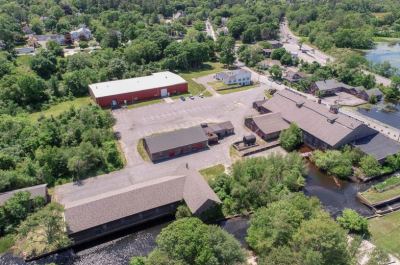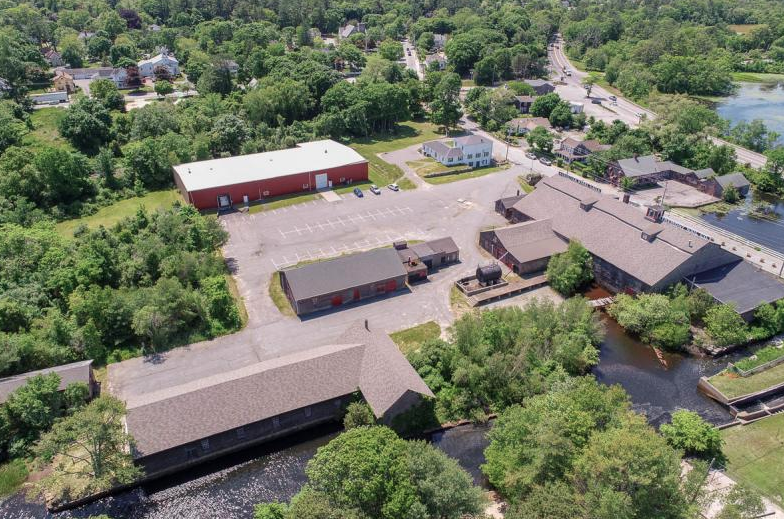Marijuana processing proposal for historic site divides Wareham residents
A proposed marijuana processing facility, and the zoning change required to make it a possibility, divided residents on Thursday. Some argued the business would revamp a historic site with 200 years of history. Others said the business, while welcome, was not a good fit for the site and some were totally against the business.
Ultimately, voters will be asked to approve the zoning change that would pave the way for one of the largest cannabis distributors in the country to open in Wareham.
On Thursday, roughly 60 people attended an informational session in Town Hall to learn more about Organa Brands. The multi-million business with an international presence is interested in operating a flagship facility on the East Coast – specifically in the historic Tremont Nail Factory complex.
A handful of people expressed reservations about the company opening at the historic site.
Resident Malcolm Phinney said he was completey against the project.
“It’s a drug, period,” said Phinney. “I can not support this at all. Let’s look at a business we can be proud of. I do not think the Town of Wareham should be involved with this at all.”
Angela Dunham, president of the Wareham Historical Society, said she would prefer to see the business open up elsewhere in town due to the site’s historical nature.
“I do not feel this is a good fit for the location,” said Dunham.
Others asked about what steps the company takes to mitigate the negative effects of cannabis addiction.
“I want to know what Organa Brands, a company that makes billions off this product, to help people who become addicted,” asked Nancy Miller. “This is a community that is already having a terrible time controlling the addictive behaviors of people in this town.”
The Colorado-based company, which launched in 2010, is eyeing space in the complex for a processing facility. The company wants to open in the “steel building,” an 80 by 180-foot building suitable for light manufacturing.
The Tremont Nail Factory complex is located on a 7.2-acre site on Elm Street. The Tremont Nail Company had manufactured cut nails and other products at the site starting in 1819. The property was sold to Wareham in 2004. It was purchased using Community Preservation Act funds. The act is a Massachusetts law that allows participating cities and towns to adopt a real estate tax surcharge, supplemented by state matching funds in order to fund community preservation.
The site is also home to historic factory buildings that town officials have been working to rehabilitate in a bid to spur development.
On Oct. 4, members of the Wareham Redevelopment Authority invited residents to hear a presentation from Christopher Driessen, president of Organa Brands. The Redevelopment Authority is tasked with managing the district.
Driessen explained what would be happening at the site if the zoning change is OK’d. Selectman and Redevelopment Authority member Peter Teitelbaum said the zoning change would open up the site for future redevelopment.
Town Meeting voters will be asked to allow light manufacturing in the district not only to accommodate Organa Brands, but to let other businesses move into the site. Teitelbaum said businesses such as a furniture refinisher, distillery, brewery and others have expressed interest. Under current zoning, none of those businesses would be allowed to open there. If approved, the new zoning would allow the following uses at the site: health and athletic facilities, apartments in mixed use buildings, conference center, hotel, light manufacturing, accessory food and beverage, artists studios, brewery and distillery.
The town would receive funds from Organa Brands in the form of rent, which Teitelebaum estimated would be six figures. He declined to give an exact figure. Teitelbaum noted the town would also receive a six-figure annual licensing fee from Organa Brands, which he also did not disclose.
Driessen said the company hoped to open early next year. He said the company considered opening in Pittsfield, Massachusetts, but opted for Wareham because of its proximity to Boston. Also, because the site is town-owned, Organa Brands would be leasing from Wareham, funneling money directly back into the community. That appealed to the company’s core values, said Driessen.
The economic impact of the company would be substantial, said Driessen. In the first 120 days, $1.5 million worth of equipment would be installed on the site. In the first year, the company would create 20 to 25 jobs with plans to ramp up to 75 jobs within three years. Driessen said the company offers medical and dental benefits and pays hourly rates between $14 to $16 an hour. Salaried job wages range from $40,000 to $60,000.
The company plans to have an operating budget of $2 million within the first two years. They plan to process 60 to 90 pounds of marijuana per day at the facility. Driessen said the product arrives in sealed containers. Odor controls on site would mitigate any smells, he said.
Driessen said no cannabis will be grown at the site or sold to the public from the facility. Organa Brands takes marijuana and processes it into a variety of products, including edibles.
“We don’t do retail. We do very few things that are public facing,” said Driessen. “If you’re concerned about the smell, if you’re concerned about noise, if you’re concerned about people – those won’t be problems. We’re largely pretty inconspicuous.”
The decision whether or not Organa Brands is allowed to open will be in voters hands on Oct. 22. Town Meeting is set for 7 p.m. in the Wareham High School auditorium. All registered voters may attend.















